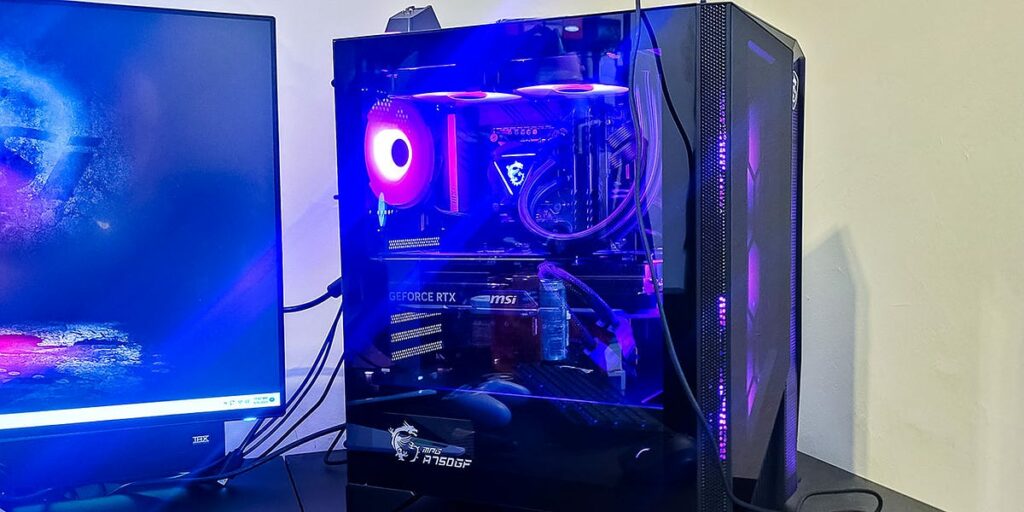🎮💻 Title: A Gamer’s Guide: Choosing the Perfect PC Components for Your Needs 💻🎮

Are you ready to embark on an exciting journey into the world of PC gaming? Building your own gaming rig opens up a realm of possibilities, allowing you to tailor your setup to your unique gaming preferences. But with so many options available, it’s essential to choose the right components to ensure optimal performance and an immersive gaming experience. In this post, we’ll explore the key considerations for selecting the perfect PC components for your needs.
1. Define Your Gaming Goals:
Before diving into the nitty-gritty of component selection, take a moment to define your gaming goals. Are you a casual gamer who enjoys indie titles and classic favorites, or are you a hardcore enthusiast seeking to conquer the latest AAA releases at maximum settings? Understanding your gaming habits and preferences will help you prioritize components and allocate your budget effectively.
2. Processor (CPU):
The CPU serves as the brain of your gaming PC, handling tasks such as game logic, physics calculations, and AI. When choosing a CPU, consider factors such as core count, clock speed, and compatibility with your chosen motherboard. For gamers, a high-performance CPU from Intel or AMD will ensure smooth gameplay and responsiveness.
3. Graphics Card (GPU):
Arguably the most critical component for gaming performance, the GPU (Graphics Processing Unit) is responsible for rendering stunning visuals in your favorite games. Look for a GPU from NVIDIA or AMD that offers the right balance of performance and affordability for your gaming needs. Consider factors such as VRAM capacity, CUDA cores (for NVIDIA GPUs), and AMD’s RDNA architecture (for AMD GPUs) to make an informed decision.
4. Memory (RAM):
RAM plays a crucial role in gaming performance, allowing your system to store and access data quickly. Aim for at least 8GB of RAM for a smooth gaming experience, with higher capacities recommended for multitasking and memory-intensive games. Opt for high-speed DDR4 memory modules for optimal performance and compatibility with modern systems.
5. Storage:
Fast storage is essential for reducing load times and enhancing overall system responsiveness. Invest in an SSD (Solid State Drive) for your operating system and frequently played games, paired with a larger HDD (Hard Disk Drive) for mass storage of media files and less frequently accessed games. Consider NVMe SSDs for even faster read and write speeds, especially for high-end gaming setups.
6. Motherboard:
The motherboard serves as the backbone of your gaming PC, providing connectivity for all your components. Choose a motherboard that’s compatible with your selected CPU and offers features such as ample PCIe slots, USB ports, and overclocking support. Consider factors like chipset compatibility, form factor, and expansion options to ensure a future-proof build.
7. Power Supply (PSU):
Don’t overlook the importance of a reliable power supply unit (PSU) in your gaming setup. Select a high-quality PSU with sufficient wattage to power your components safely and efficiently. Look for features such as 80 Plus certification for energy efficiency, modular cabling for easier cable management, and adequate protection mechanisms to safeguard your investment.
8. Case and Cooling:
Finally, choose a PC case that not only accommodates your chosen components but also offers adequate airflow and cooling options. Consider factors such as case size, airflow design, and cable management features to keep your system running cool and quiet during intense gaming sessions. Invest in aftermarket CPU coolers and case fans for optimal thermal performance and overclocking potential.
By carefully selecting and assembling the right PC components for your gaming needs, you’ll be well on your way to building the gaming rig of your dreams. Whether you’re a casual gamer or a seasoned enthusiast, a custom-built PC offers unparalleled performance and customization options to elevate your gaming experience to new heights. Happy gaming! 🚀🎮